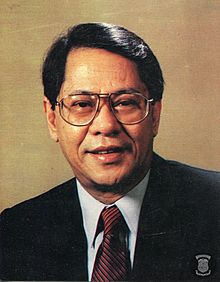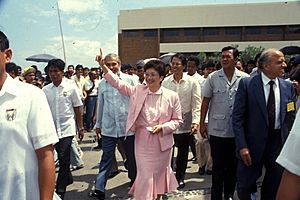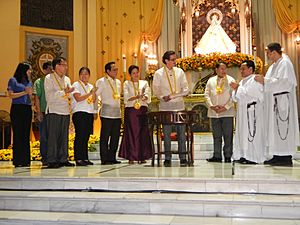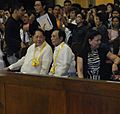Edgardo Angara facts for kids
Quick facts for kids
Edgardo J. Angara
|
|
|---|---|

Angara in 2000
|
|
| 14th President of the Senate of the Philippines | |
| In office January 18, 1993 – August 28, 1995 |
|
| Preceded by | Neptali Gonzales |
| Succeeded by | Neptali Gonzales |
| Senator of the Philippines | |
| In office June 30, 2001 – June 30, 2013 |
|
| In office June 30, 1987 – June 30, 1998 |
|
| 32nd Executive Secretary of the Philippines | |
| In office January 6, 2001 – January 20, 2001 |
|
| President | Joseph Estrada |
| Preceded by | Ronaldo Zamora |
| Succeeded by | Renato de Villa |
| 35th Secretary of Agriculture | |
| In office May 25, 1999 – January 6, 2001 |
|
| President | Joseph Estrada |
| Preceded by | William Dar |
| Succeeded by | Domingo F. Panganiban |
| Senate Minority Leader | |
| In office August 28, 1995 – October 10, 1996 |
|
| Preceded by | Wigberto Tañada |
| Succeeded by | Neptali Gonzales |
| 15th President of the University of the Philippines | |
| In office 1981–1987 |
|
| Preceded by | Emanuel V. Soriano |
| Succeeded by | José Abueva |
| Personal details | |
| Born |
Edgardo Javier Angara
September 24, 1934 Baler, Tayabas, Insular Government of the Philippine Islands |
| Died | May 13, 2018 (aged 83) Tagaytay, Cavite, Philippines |
| Political party | Laban ng Demokratikong Pilipino |
| Other political affiliations |
Independent (1987–1992) |
| Spouse | Gloria Manalang |
| Children | Rosalyn "Anna" Angara Juan Edgardo "Sonny" Angara Alexandria "Alex" Angara-Cole Katerina "Katya" Angara |
| Alma mater | University of the Philippines (LL.B) University of Michigan (LL.M) |
| Profession | Lawyer |
Edgardo Javier Angara (Tagalog pronunciation: [aŋˈɡara], September 24, 1934 – May 13, 2018) was an important Filipino politician. He served as the President of the Senate of the Philippines from 1993 to 1995. He was also a Senator for many years, from 1987 to 1998 and again from 2001 to 2013. Besides his work in the Senate, he was the Secretary of Agriculture from 1999 to 2001. Before entering national politics, he was the President of the University of the Philippines.
Contents
Early Life and Education
Edgardo Angara was born on September 24, 1934, in Baler, Aurora. His parents were Juan Angara and Juana Javier. He studied law at the University of the Philippines and finished his degree in 1958. During his time at university, he joined the Sigma Rho fraternity. After graduating, he became a member of the Pi Gamma Mu and Phi Kappa Phi honor societies. He later earned a Master of Laws degree from the University of Michigan Law School in 1964.
Starting His Career
In 1972, Angara helped start the ACCRA Law Offices. This law firm became one of the most well-known in the Philippines. He also led important legal groups like the Philippine Bar Association and the Integrated Bar of the Philippines. He even founded the ASEAN Law Associated, which connects lawyers in Southeast Asia.
Leading the University of the Philippines
From 1981 to 1987, Angara was the President of the University of the Philippines. He worked hard to improve the university. He encouraged former students to donate money for new projects and to support teachers. Under his leadership, the university improved its courses, especially in arts and sciences. He also made sure the university could make its own decisions and keep its high academic standards.
Serving as a Senator (1987−1998)
Angara's success in education led him to politics. He first became a senator in 1987. He was known for being a strong leader who could bring people together. He often found ways to solve problems without causing arguments.
Leading the Senate (1993−1995)
From 1993 to 1995, Edgardo Angara was the President of the Senate of the Philippines. As the Senate leader, he helped pass many important laws. He worked with the President to improve the country's economy. During his time, the Senate also supported laws to protect the environment.
Key Laws and Initiatives
Angara was very active in creating laws that helped Filipinos.
- He led a group that looked at education in the Philippines. This led to the creation of the Commission on Higher Education (CHED) and the Technical Education and Skills Development Authority (TESDA). These groups help manage college education and skills training.
- He wrote the Free High School Act. This law made sure that all young people, even those from poor families, could go to high school for free.
- He also wrote the Senior Citizens Act, also known as the Angara Law. This law gives older people discounts on medicine and public transportation.
- He was a key author of the National Health Insurance Act, which created PhilHealth. This program provides health insurance to all citizens.
- He helped create the Government Assistance to Students and Teachers in Private Education (GASTPE). This is a large scholarship program for students and teachers.
- His Agriculture and Fisheries Modernization Act of 1997 (AFMA) helped farmers and fishers. It gave them better seeds, irrigation, and ways to sell their products.
- He also wrote the Magna Carta for Public Health Workers. He was a main author of the laws that created the new National Museum and the National Commission on Culture and the Arts.
Running for Vice-President (1998)
In 1998, Angara planned to run for president. However, he decided to run as Vice President with Joseph Estrada instead. Even though Estrada won the presidency, Angara lost the vice-presidential race to Gloria Macapagal Arroyo.
Working in the Estrada Administration (1998−2001)
After the 1998 election, President Estrada appointed Angara to important roles.
Leading the Philippine National Bank
From 1998 to 1999, Angara was the chairman of the Philippine National Bank. He introduced important changes to the bank during his time there.
Secretary of Agriculture (1999−2001)
In 1999, Angara became the Secretary of Agriculture. In this role, he put his own law, AFMA, into action. He worked to improve food production, especially rice. This helped the country become more secure in its food supply. The farming sector grew significantly under his leadership.
Executive Secretary (2001)
In January 2001, Angara was appointed Executive Secretary by President Estrada. He served in this role for only 14 days. This was during a difficult time when President Estrada was facing an impeachment trial. Angara remained loyal to Estrada until the end of his presidency.
Return to the Senate (2001–2013)

Angara was elected as a senator again in 2001. He was re-elected for a fourth term in 2007. This made him one of the longest-serving senators after the EDSA Revolution. He continued to write and support many important laws. These included the Free High School Education Act, the GASTPE Law, the Generics Act, and the law that created Philhealth. He also supported the original Senior Citizens Act, the Agricultural and Fisheries Modernization Act, and the Renewable Energy Act.
In 2007, Senator Edgardo Angara and his son, Rep. Juan Edgardo Angara, helped create the Aurora Special Economic Zone Authority (ASEZA). This group manages an economic zone in Casiguran, Aurora. The zone was later renamed the Aurora Pacific Economic Zone and Freeport Authority (APECO). APECO was created to bring jobs and improve the economy in Aurora and nearby provinces.
In the Senate, Angara led committees on education, arts, culture, science, and technology. From January to May 2012, he was one of the senators who judged the impeachment trial of Chief Justice Renato Corona. He voted to remove the Chief Justice from office.
Angara's fourth term as Senator ended on June 30, 2013.
Special Envoy to the European Union (2017–2018)
In May 2017, President Rodrigo Duterte appointed Edgardo Angara as a special representative for the Philippines to the European Union.
Death
Edgardo Angara passed away on May 13, 2018, at the age of 83. His son, Sonny Angara, announced his death. Many people, including former senators and presidents, attended his funeral. President Rodrigo Duterte and Vice President Leni Robredo also visited his funeral. He was buried in his hometown of Baler, Aurora.
Images for kids
See also
 In Spanish: Edgardo Angara para niños
In Spanish: Edgardo Angara para niños
 | Janet Taylor Pickett |
 | Synthia Saint James |
 | Howardena Pindell |
 | Faith Ringgold |




